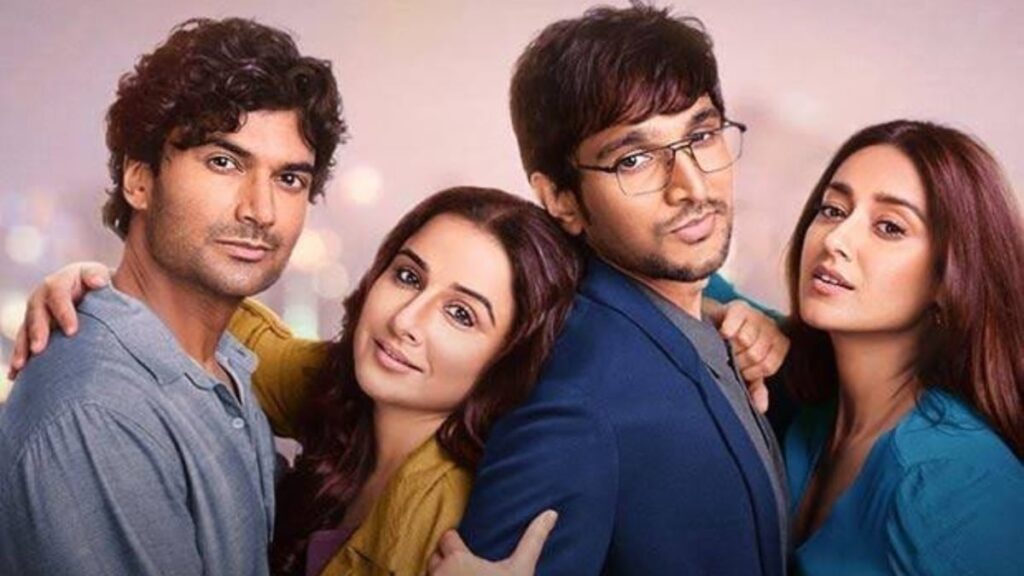Do Aur Do Pyaar, directed by freshman Shirsha Guha Thakurta, is a rueful, somber and gentle remake of The Lovers (2017), that explores middle-age relationships with ample sensitivity and maturity.
The film follows the strained equation of an on-the-brink-of-their-40s couple, Aniruddh Banerjee (Pratik Gandhi) and Kavya Ganesan (Vidya Balan), who believe their marriage has nothing more to offer and seek pastures anew. They both indulge in full blown extramarital affairs with aspiring actress, Nora (Ileana D’Cruz), and NRI photographer, Vikram (Sendhil Ramamurthy), respectively. An unexpected outstation trip together compels Anirudh and Kavya to reinvestigate their relationship…
First off, it is refreshing to see a tale such as Do Aur Do Pyaar explore relationships through the lens of a largely neglected demographic in mainstream cinema – the middle-aged. To her credit, Thakurta gives us a delicate and compassionate exploration of the impulses and desires of an age group, who are expected to behave with a certain sense of responsibility and integrity. She grounds the film firmly by focusing on mundane and minute details that rationalise the equations shared between her characters and their personalities, thereby increasing the narrative’s relatability factor. Thakurta and her writers take care to carefully balance the film’s constant melancholic tone with dry wit and humor. A nod must also be given to the makers for smartly utilizing the harsh Bombay monsoon as an effective backdrop – the majority of the plot unravels in interior settings, giving the entire film a sense of comfort, coziness and a surprisingly forced intimacy that works quite well in the grand scheme of things.
Aniruddh represents a large chunk of middle-class males, who are ordered by their families to cease to pursue their passions and divert their focus on getting stable, salaried jobs that will ‘settle them’. Such people often bear deep regret and resentment within themselves, consoling themselves by dreaming of what if scenarios, or even worse, trying to forget that aspect of their personality. This bitterness later manifests as insecurities and anger directed and blamed at others, when they are in fact enraged at themselves for not holding their own. Such people constantly look for escape routes to alleviate the pain and unfortunately for Kavya, she too is a reminder to Anirudh of the agonising past. He turns to his mistress Nora, as they both find solace in each other’s failures and struggles. Kavya, on the other hand, epitomizes the confident, adventure seeking, outspoken and headstrong woman, who holds her own set of emotional baggage deep down. It is interesting to note how someone who comes across as so sure footed is actually terrified of commitment, (even with her husband of 12 years!) and yet yearns regular injections of validation – which she got once upon a time from her father, later from Anirudh and now from a dashing Vikram.
What feels so natural about Aniruddh and Kavya’s dynamic is that it genuinely feels as though they have been together since their college days – the element of surprise that initially got them to boldly elope has now been reduced to minimal, none-too-exciting interactions due to domestic and professional responsibilities. That said, it only takes a slight trigger to reinvigorate the fervour of the past, and one can’t help but feel sorry for people like Vikram and Nora, who hope for a better and steady future for themselves but emotionally attach themselves to people who think of them merely as backup options. The makers have done what was logical by presenting Kavya’s strained relationship with her disapproving and disappointed father, but resolving this equation feels unnecessarily laboured, synthetic, and ultimately counterproductive.
Impactful and nuanced performances are what drive the narrative forward in Do Aur Do Pyaar. Having said that, the dialogues do feel slightly overwrought in some places, reminding the viewer that they are watching a film. The progression in moments of conflict and outbursts also seem abrupt and irregular, which, if further polished by Thakurta, could have amplified the overall dramatic quotient.
Thakurta’s advertising background is evident in the visual treatment of the film with easy-on-the-eye, color coordinated production design and the restrained yet striking cinematography, both of which are in perfect unison with the mood and tone at large. The sound design is functional and neat, with generous use of ambient and incidental sounds. The one objection with the entire soundscape is the film’s background score, which feels more like an afterthought and frankly dispensable. The songs are within the context of the plot and catchy. And though the entire narrative flows at a measured rhythm and easy going pace, evoking a sense of much needed composure and aiding the viewer to wholly invest in the film’s stakes, the film feels at least twenty minutes too long.
Even though Do Aur Do Pyaar falls slightly short of the best that it could achieve, it is exciting to see subject matter that was once considered controversial receive pragmatic and humane consideration accompanied with sincere execution. Hopefully, this will definitely encourage more and more filmmakers to tackle such themes more often.
Hindi, Drama, Comedy, Color


